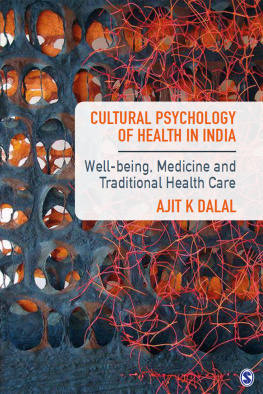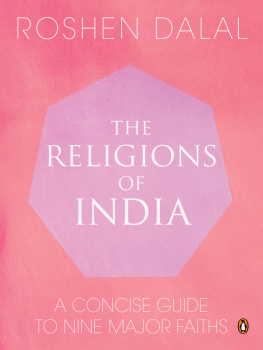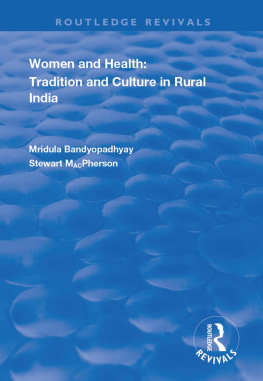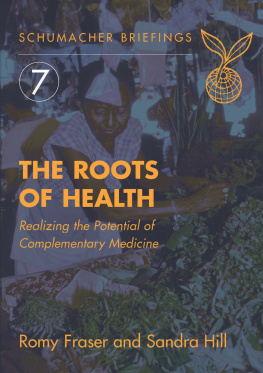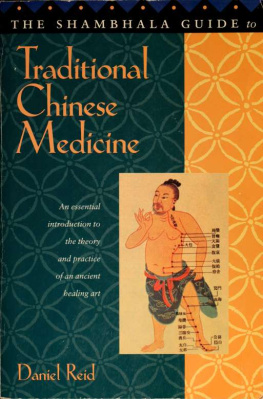Dalal - Cultural Psychology of Health in India: Well-being, Medicine and Traditional Health Care
Here you can read online Dalal - Cultural Psychology of Health in India: Well-being, Medicine and Traditional Health Care full text of the book (entire story) in english for free. Download pdf and epub, get meaning, cover and reviews about this ebook. publisher: SAGE Publications India Pvt. Ltd, genre: Politics. Description of the work, (preface) as well as reviews are available. Best literature library LitArk.com created for fans of good reading and offers a wide selection of genres:
Romance novel
Science fiction
Adventure
Detective
Science
History
Home and family
Prose
Art
Politics
Computer
Non-fiction
Religion
Business
Children
Humor
Choose a favorite category and find really read worthwhile books. Enjoy immersion in the world of imagination, feel the emotions of the characters or learn something new for yourself, make an fascinating discovery.
Cultural Psychology of Health in India: Well-being, Medicine and Traditional Health Care: summary, description and annotation
We offer to read an annotation, description, summary or preface (depends on what the author of the book "Cultural Psychology of Health in India: Well-being, Medicine and Traditional Health Care" wrote himself). If you haven't found the necessary information about the book — write in the comments, we will try to find it.
Dalal: author's other books
Who wrote Cultural Psychology of Health in India: Well-being, Medicine and Traditional Health Care? Find out the surname, the name of the author of the book and a list of all author's works by series.
Cultural Psychology of Health in India: Well-being, Medicine and Traditional Health Care — read online for free the complete book (whole text) full work
Below is the text of the book, divided by pages. System saving the place of the last page read, allows you to conveniently read the book "Cultural Psychology of Health in India: Well-being, Medicine and Traditional Health Care" online for free, without having to search again every time where you left off. Put a bookmark, and you can go to the page where you finished reading at any time.
Font size:
Interval:
Bookmark:

Ajit K Dalal is currently Writer-in Residence at the Mahatma Gandhi Antarrashtriya Hindi Vishwavidyalaya, Wardha, Maharashtra. He has recently retired as a professor of psychology from the University of Allahabad. He was the Head of Psychology Department (20112012) and had held several other academic positions at the university. He was the editor of an international journal, Psychology and Developing Societies (20012011). He is also on editorial boards of several other journals.
Professor Dalal received the Fulbright Senior Fellowship in 1982. He worked at the University of California, Los Angeles and at the University of Michigan, Ann Arbor. He is also a recipient of the University Grants Commission's (UGC) Career Award (19901993), Rockefeller Foundation Award (1992) and the Senior Research Fellowship (1998 and 2012) from Indian Council of Social Science Research (ICSSR). He was an adjunct professor at Queen's University, Canada (19921998) and was a visiting faculty at several institutions, including National Institute of Health and Family Welfare, New Delhi; Indian Institute of Management, Ahmedabad and University of Calcutta, Kolkata.
Professor Dalal has published his work in the areas such as causal attribution, health beliefs and healing traditions of India and Indian psychology. He has published about 95 research articles and book chapters. He has also published several books; prominent among them are: Attribution Theory and Research (1988), New Directions in Indian Psychology (Vol. 1) (with G. Misra, 2002), Social Dimensions of Health (with S. Ray, 2005), Handbook of Indian Psychology (with K. R. Rao and A. C. Paranjpe, 2008), New Directions in Health Psychology (with G. Misra, 2011), Qualitative Research on Well-Being and Self-Growth: Contemporary Indian Perspectives (with R. Priya, 2014) and Health Beliefs and Coping with Chronic Diseases (2015).
I n its quest to be a universal science, research in psychology has almost ignored culture as a legitimate field of investigation for a long time. The focus was on identifying universal attributes of human behaviour and developing theories and explanations applicable across cultures. In fact, the mainstream psychology, particularly the Western psychology, found culture as problematic in its pursuit to be scientific and empirical. For a long time, culture has been treated as some objectively bounded condition, like geographical region, and comparisons have been made between people of different nationalities. The research in this area expanded by taking an extended definition of culture in which attributes such as religion, caste, language and ethnicity were included. Culture becomes the basis to differentiate human groups and also the basis to explain and predict behaviour (Kazarian & Evans, 2001). A more relativistic position, taken in later years, focused on the meaning and functions of cultural symbols as embodied in social transactions and individual behaviour. It led to the development of culturally grounded theories in various fields of psychology. Contemporary research in psychology holds that individual and culture are bound in a close symbiotic relation. In the socialization process, cultural meanings of objects and concepts are internalized by its members, as at the same time, new meanings and patterns of behaviour emerge in social interaction (Miller, 1997; Valsiner, 2007). People can be classified as belonging to different cultures, and at the same time, culture is viewed as a system that organizes psychological world of individuals. Cultural psychology thus encompasses beliefs, attitudes, knowledge, traditions, symbols, customs, ethics, morals, social institutions and shared history which shape and are shaped by collective behaviour of people in a particular society.
Quite often the terms ethnic, folk, traditional, indigenous and cultural psychology are used interchangeably. Psychological research and writings in these areas overlap in conceptualization and coverage of the subject matter. Much is written on the cultural aspects of human behaviour in the present times. German scholar, Wilhelm Wundt, who is credited with the first psychology laboratory at Leipzig, Germany, in 1879, was also a pioneer in the field of cultural psychology. It is little known that he wrote in the period 19101920, a ten-volume long treatise on the Vlkerpsychologie (cultural psychology). He compiled and integrated social theories, customs, traditions, beliefs and practices of the Western world and scientifically analyzed them. He examined the meaning of cultural artefacts and language, and endeavoured to understand higher-order mental processes, while leaving the basic processes to experimental psychological inquiries (Shiraev, 2010). Unfortunately, his important contribution was completely ignored by his contemporary and later psychologists in their pursuit to promote experimental tradition. Culture as an important consideration in psychological research was resurrected only in last decades of the past century.
Following Descartenian logic of mindbody dichotomy, historically a differentiation was made between physical and mental health, consequently leaving physical health in the hands of medical professionals. Clinical psychology developed as a new branch of psychology to diagnose mental pathologies and psychotherapies. Freudian psychoanalysis contributed significantly in the development of this field. At the same time, it was acknowledged by many health practitioners that specific organic illnesses are the result of mental conflicts and personality disorders. Dunbar (1943), for example, argued that conflicts produce anxiety which becomes unconscious and causes ulcer. His and other work in this area gave rise to a new branch of psychosomatic medicine. This development was reassertion of the age-old belief that mind and body closely interact, and that bodily diseases are caused by the mental state. Research accumulated over the years to establish that psychological variables play a vital role both in causing and recovering from illness and also in maintaining good health. This led to the emergence of a new discipline of health psychology (Taylor, 2006). Presently, health psychology is the most rapidly growing branch of psychology all over the world.
It is only in the last two decades that health psychologists started getting engaged in cultural imperatives of health. Anthropological work has examined health and healing practices of different regions of the world and provided evidences of their efficacy in dealing with many mental and physical health problems (Kleinman, 1987). This line of work got many health psychologists interested in more thoroughly examining the cultural aspects of health. Another compelling factor was that with heavy influx of immigrants, Western societies were becoming multicultural (Mather, 2009). To deal with health problems of immigrants, it was realized that knowledge about their native culture was necessary. Many indigenous health care practices were also brought along by the immigrants, which now constitute a part of the alternative medicinal system. Today, with high population mobility across the globe, all major countries of the world are turning multicultural. Alternative health care practices are now accepted and practised by a wide cross section of the population. The third factor behind the emergence of cultural psychology of health was defining health in terms of well-being. This broad definition covers all the aspects of health, including positive and growth-related ones which are often contingent on their cultural beliefs, values and practices. In this backdrop, the cultural psychology of health is that branch of psychology which deals with culturally determined health behaviour and well-being.
Font size:
Interval:
Bookmark:
Similar books «Cultural Psychology of Health in India: Well-being, Medicine and Traditional Health Care»
Look at similar books to Cultural Psychology of Health in India: Well-being, Medicine and Traditional Health Care. We have selected literature similar in name and meaning in the hope of providing readers with more options to find new, interesting, not yet read works.
Discussion, reviews of the book Cultural Psychology of Health in India: Well-being, Medicine and Traditional Health Care and just readers' own opinions. Leave your comments, write what you think about the work, its meaning or the main characters. Specify what exactly you liked and what you didn't like, and why you think so.

